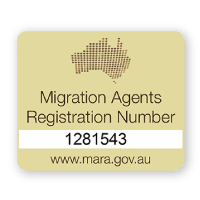
If your visa has been turned down, then it’s normal to feel disheartened. However, while this is a bump in the road, it doesn’t need to be the end of your journey to Australia. There are avenues you can take to appeal the decision.
If you find the visa process overwhelming, you’re not alone. Get Your Visa can help simplify the process. It is our mission, as a registered Migration Agency with years of experience, to provide you with the most suitable solution in order to get your visa approved.
For now, let’s talk about how to effectively navigate the next steps.
What does AAT visa refusal appeal mean?
The AAT is the Administrative Appeals Tribunal. This department is tasked with assessing, and subsequently upholding or remitting the visa decisions made by the Department of Home Affairs.
If your visa has been denied, in most cases you are entitled to appeal the decision with the AAT. The AAT will review your refusal. The department will go over the reason for refusal and all supporting documentation, including personal statements, financial records, relationship proof for partner visas, work history, as well as expert reports such as medical and character references.
In most cases, this will be followed by a hearing, either in person, or online. At the hearing, you will have the opportunity to explain your case, provide additional evidence and answer any questions from the tribunal member. In some cases, the tribunal member will ask for more documents before making a final decision.
Remember that the AAT does not make new laws or exceptions—they apply the same legal criteria the Department used. However, they can interpret the law differently or weigh the evidence differently, which is why some refusals get overturned.
This process may lead to the affirmation, remittance, variation or substitution of the original decision.
Common reasons for visa refusal
There are a number of reasons why your visa application might have been refused, some of the most common being :
1. Failure to meet the eligibility criteria
Every visa has its own set of requirements—whether it’s work experience, financial stability, or sponsorship details. If an application doesn’t tick all the right boxes, it’s likely to be refused.
2. Insufficient documentation
Missing paperwork is a big red flag. Immigration authorities need solid proof to back up your claims, so if key documents (like financial statements or relationship evidence) are missing or incomplete, it can lead to a quick refusal.
3. Concerns about the authenticity of the provided information
If the Department suspects that any part of your application isn’t genuine—whether it’s a forged document or inconsistent statements—it can result in an automatic refusal. Even honest mistakes can raise doubts, so accuracy and transparency are crucial.
4. Health or character issues
A visa can be refused if the applicant poses a potential risk to public health or safety. This could include failing the required health checks or having a criminal record that doesn’t meet Australia’s character requirements.
How to appeal Australian tourist visa refusal?
If your Australian tourist visa has been refused, you may have the option to appeal the decision through the Administrative Appeals Tribunal (AAT). Here’s how the process works :
First, check if you’re eligible for an appeal. Not all visa refusals can be appealed. Your refusal notice from the Department of Home Affairs will specify whether you have appeal rights. If you applied outside Australia, you usually cannot appeal, but if you applied while in Australia, you may be eligible.
Next, lodge an appeal with the AAT. You must apply to the AAT within the deadline stated in your refusal notice (usually 21-28 days). Appeals must be submitted online via the AAT website. The AAT application fee (currently $3,374) applies, though a 50% refund may be available.
Then, it’s time to prepare your supporting evidence. Your appeal is a chance to strengthen your case, so you should provide additional evidence addressing the specific refusal reasons—this might include more financial proof, stronger ties to your home country that make it clear you intend to return, or clarification of any concerns raised by the Department.
Finally, attend the AAT hearing. In most cases, you’ll be invited to a hearing where you can present your case in person, via video call, or through a representative. This is your opportunity to explain why you meet the visa requirements and provide further context.
The last part is also the hardest – waiting for the AAT to make its final decision. This may mean overturning or upholding the refusal, or sending it back for reconsideration with guidance.
How much does it cost to appeal visa refusal?
Like most aspects of the visa process, the AAT fees for visa refusal aren’t cheap.
The AAT visa refusal appeal fee is currently $3,374. However, a 50% refund may be available if the applicant is facing financial difficulty.
Unlike in previous years, the current administration does not provide any refund if the case is successful or withdrawn early.
Even if you’re eligible for the 50% refund, you’ll still have to pay the full fee upfront, and then apply for the reduction.
Tips to strengthen your AAT visa refusal appeal
The most important part of your AAT visa refusal appeal is specificity. Identify why the visa was initially turned down by the Department of Home Affairs, and tailor your appeal to address and remedy this concern.
Your notice of refusal contains the information you need – namely the reason for refusal, whether you’re eligible for an appeal, and how much time you have to lodge this appeal with the AAT.
Here are some other tips to get ready for your visa refusal appeal :
- Provide specific evidence that addresses the Department’s concerns. For example, if your visa application has been denied because of a concern about you returning to your home country, you might provide evidence of strong ties including evidence of employment, property ownership, or family and community commitments. If the concerns are financial, then it will be helpful to show evidence of further funds.
- At the hearing, give truthful, consistent answers as any discrepancies can undermine your credibility. Visa application processes can be rigorous and emotionally exhausting, but it’s imperative that you stay calm and have a respectful demeanour throughout the hearing.
- Show your commitment to obeying Australian immigration laws by providing evidence of past visa history. This will be doubly helpful if you have a record of times in the past when you have left Australia before your visa expired, as well as any other positive interactions with immigration authorities. This will reassure the AAT of your compliance.
If you’re unsure of the process or what evidence is necessary, Get Your Visa can help.
With years of experience and a 96.77% success rate in securing Australian visas, we can help you structure your appeal in a way that presents your case more effectively.
What to do if your appeal is unsuccessful?
First, don’t lose hope. There are still avenues available to you, and the right immigration agent can help you forge a new path to Australia.
You should review the AAT’s decision carefully – they will always provide written clarification. Go through it thoroughly to understand why your appeal was denied. This will help you determine your next steps.
In very limited and exceptional circumstances, you may request that the Minister for Immigration intervene in your case, but Ministerial Intervention is entirely discretionary, with strict criteria and no guarantee of consideration.
Even if your appeal is unsuccessful, you might still be eligible to apply for a different visa. In this new application, you should be sure to address the previous refusal reasons and provide additional evidence.
FAQ’s
1. What happens after winning an AAT case?
Winning your AAT case is a huge relief, but your next steps are not as simple as you might think.
The AAT can’t grant you the visa directly—instead, they send their decision back to the Department of Home Affairs, who will usually reconsider your application in line with the tribunal’s findings.
In most cases, this means your visa is likely to be approved, but you might still need to provide updated documents, meet any outstanding requirements, or go through final processing. Make sure you respond to any requests from the Department promptly.
If you’re unsure about anything, it’s always a good idea to check in with a migration expert to make sure everything goes smoothly.
2. How long do AAT decisions take?
By their own admission, the AAT takes a long time to come to a decision – the AAT processing time for protection visas is particularly long. Processing times are subject to change and can vary depending on the complexity of the case and tribunal priorities.
In most cases, AAT visa refusal appeal processing time can run up to a year, if not longer.
The AAT processing time for partner visa will be longer, while others, such as visitor visa appeals, may be processed more quickly. The AAT does prioritise certain cases, especially those involving serious hardship, but there’s no set timeline.
If you’d like to know more about protection visa AAT processing time, as well as other kinds of visa wait times, the below gives an estimation of how long you’ll wait :
| Type of case | 95% of cases finalised within |
|---|---|
| Bridging | 343 days |
| Family | 1690 days |
| Nomination/ sponsor approval | 1609 days |
| Partner | 1877 days |
| Permanent business | 1186 days |
| Skilled linked | 909 days |
| Student cancellation | 638 days |
| Student refusal | 761 days |
| Temporary work | 1103 days |
| Visitor | 494 days |
| Protection | 2243 days |
| Other | 1540 days |
3. Can I apply for an Australian visa after protection visa refusal?
In most cases, a Section 48 bar applies, meaning you can’t apply for most other visas while staying in the country. However, there are some exceptions, such as a partner visa or a bridging visa.
If you’re outside Australia, you can apply for a different visa, but your previous refusal might affect the outcome. Get Your Visa can offer advice to better understand your options and the best way forward.
4. What is the success rate of the AAT appeal?
The success rate depends on the type of visa involved. Here’s a breakdown based on available data :
- Partner Visas : Approximately 61% of appeals are successful.
- Family Visas : Approximately 57% of appeals are successful.
- Skilled Visas : Approximately 40% of appeals are successful.
- Student Visas : Approximately 30-40% of appeals are successful.
- Protection Visas : These have a lower success rate, with only about 12% of appeals being successful.
5. What does it mean when your visa is refused for administrative processing?
If your visa is refused for administrative processing, it typically means that your application requires further review before a final decision can be made. This isn’t necessarily a permanent refusal—rather, it’s a delay while additional checks are carried out.
This can happen for a few reasons, such as background checks, security clearances, or verification of documents. In some cases, the processing may be routine, while in others, it could indicate concerns about the information provided in your application.
The visa may still be approved once the review is complete. If you’ve received a refusal due to administrative processing, you should check if there’s an option to provide further evidence or if you need to wait for further instructions from the immigration department.
6. Can AAT make a decision without a hearing?
Though less common, yes, the AAT can make a decision without a hearing.
This usually happens when :
- The tribunal has enough evidence to make a fair decision based on the documents provided.
- Both you and the Department of Home Affairs agree that a hearing isn’t necessary.
- Your case is withdrawn before the hearing.
- The AAT finds that it does not have jurisdiction to review your case.
If your visa has been turned down, then it’s normal to feel disheartened. However, while this is a bump in the road, it doesn’t need to be the end of your journey to Australia. There are avenues you can take to appeal the decision.
If you find the visa process overwhelming, you’re not alone. Get Your Visa can help simplify the process.
It is our mission, as a registered Migration Agency with years of experience, to provide you with the most suitable solution in order to get your visa approved.
For now, let’s talk about how to effectively navigate the next steps.
If you would like to book a consultation with one of our agents, just call us on (08) 6117 4152 or click on this following like to book your appointment https://www.getyourvisa.com.au/book-a-consultation/.
We assist employers and visa applicants to define their journey in the Migration process to Australia.






